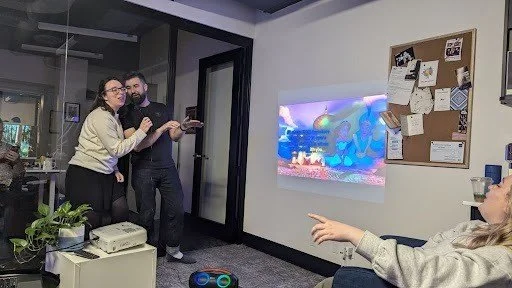Why We Retreat
Adverbians Andrea Hirji, and Tyler Butler sing a karaoke tune together while Paige Simpson encourages them from the side.
Next week, Adverb is having its fourth annual staff retreat—two days where our entire, mostly-remote team comes together in person.
And in these four years, our retreats have changed. A lot.
At our first retreat, we worked as a (small) team to set goals for the organization. But we soon learned that when everyone holds different information about the company, it was a difficult exercise.
At our second retreat, we set out to solve Adverb’s biggest problems and challenges together. A great idea, in theory. In reality, not all challenges can be put aside until we all meet in person, and sometimes, they need more than a day to work through.
As remote has always been a crucial part of what we do here at Adverb, we realized that we had been focusing on the wrong thing. The retreat needed to focus on connecting with each other. On building relationships. On having fun. On being together.
Our team works all across the country, and we’ve grown every year. For some of our team members, the retreat is their first opportunity to actually meet the people they’ve been working with virtually. Others are reuniting for the first time since the last retreat.
Seeing the team connect in this way inspired us to start to rethink what a day at an Adverb retreat looked like. Two years ago, we planned a full day of activities, filling our time with a mix of work-related business and fun things to do as a team. And it was fun—but we also exhausted our team.
Last year, we tried a different approach. We purposefully left a chunk of the day with nothing planned to give the team the flexibility to do whatever they wanted—to rest and recharge. We had expected the team to go home or back to their hotels before meeting up again for supper. What really happened?
Let’s just say that Adverb now owns a karaoke machine.
Impromptu office karaoke made one thing clear: the team really did want to spend time with each other. But coming up with that plan of what to do in the moment only took time away from being together.
This year, we’re going back to planning more activities. Only this time, we’re keeping it simple. We’re providing the time and space to connect and learn together, and making room for some fun and silly games.
“Silly” might not be something most companies have in their business plans or on agendas for corporate retreats. But making time for fun and play is both strategic and necessary.
Especially for this team of high-performing ding-dongs.
